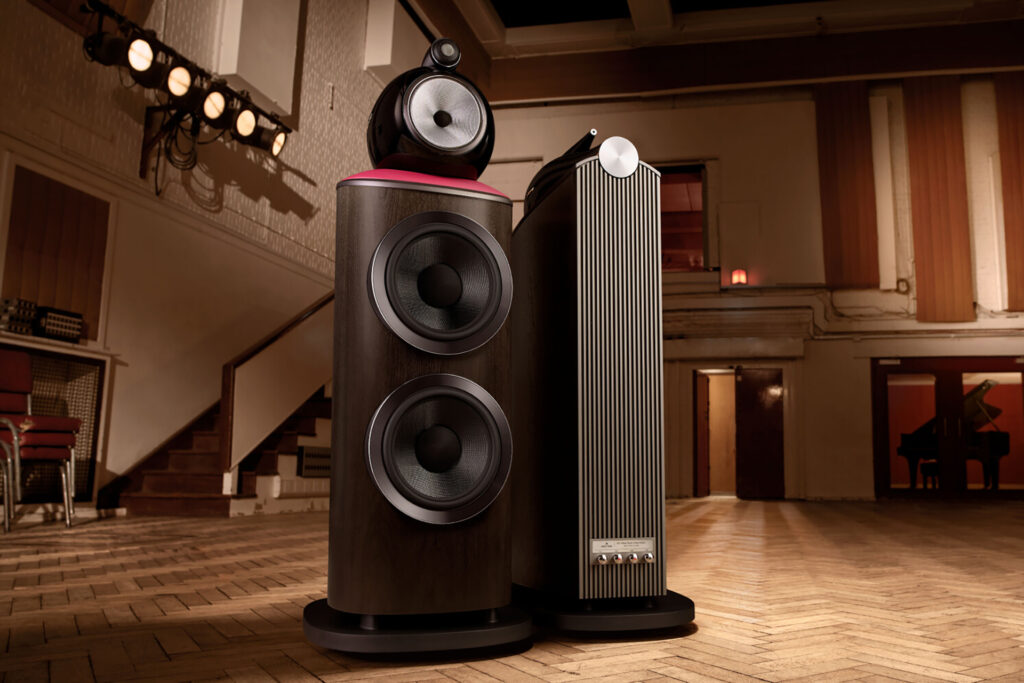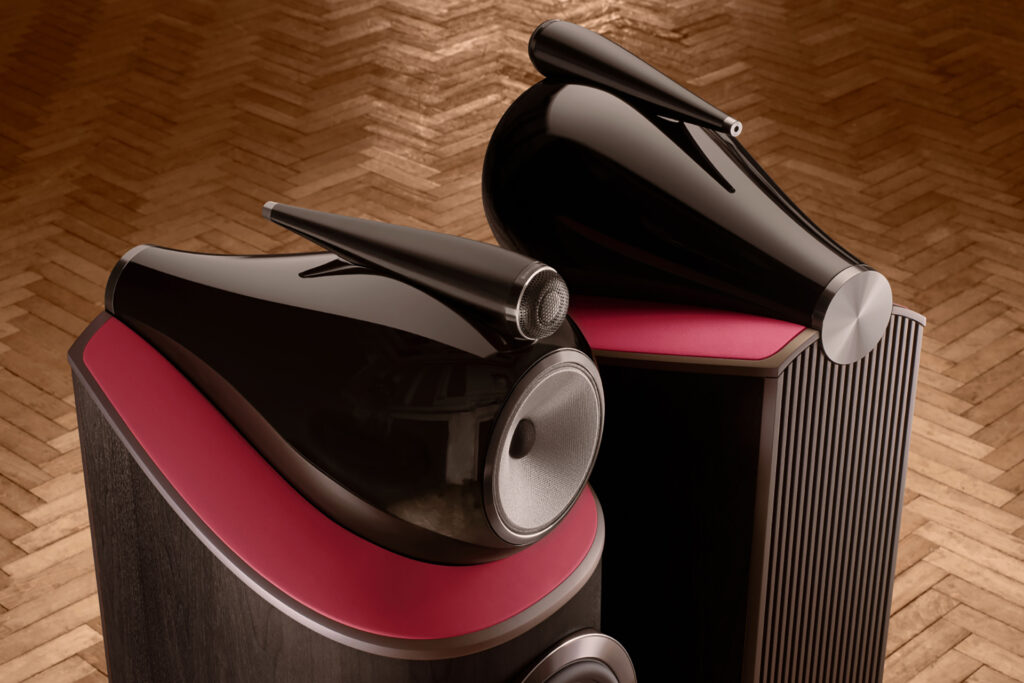Since opening its doors in 1931, Abbey Road Studios has been instrumental in shaping the landscape of popular music. Its unique spaces have inspired generations of artists and composers to create era-defining work, while its skilled engineering team have reinvented the way music is created and heard, from the ground-breaking invention of stereo and Artificial Double Tracking (ADT), to countless technical innovations which have helped define modern music recording.
In 1980, John Bowers visited Abbey Road Studios to demonstrate his new design, the Bowers & Wilkins 801 loudspeaker – the first of what he described as “a new generation of loudspeakers designed for both the professional and the exceptionally critical listener.” Designed to be the ultimate loudspeaker for hi-fi enthusiasts, the 801 was also specifically developed to be accurate enough for use in professional studios. The engineers at Abbey Road immediately understood its value, and adopted it as their monitor of choice, becoming the first recording studio in the world to use the 801 full time.

This marked the start of an enduring and incredibly fruitful 45-year relationship. Since 1980, six successive generations of Bowers & Wilkins 800 Series loudspeakers have graced and been embraced by the world-class studio engineering team in Abbey Road’s control rooms.
Introducing the 801 Abbey Road Limited Edition
The 801 Abbey Road Limited Edition is a celebration of this unique 45-year relationship.
It takes the very best loudspeaker Bowers & Wilkins currently makes, the flagship 801 D4 Signature, and reframes it in homage to the world’s most iconic recording studio.
The 801 Abbey Road Limited Edition boasts a carefully crafted Vintage Walnut cabinet inspired by the studios’ iconic interiors and the countless iconic musical instruments that have enriched recordings at Abbey Road over the decades. Complementing this unique wooden finish is a bespoke red Leather by Connolly trim that references both the aesthetic of the control room in Studio Two, arguably the world’s most famous individual studio space, and the red leather chairs used by generations of performers throughout Abbey Road. The design also includes a unique identifying plate on its rear panel, designed to mark its status as one of just 140 pairs of loudspeakers being produced. Buyers will also receive a unique, specially commissioned book that details the history of the two brands and their collaboration, featuring never-previously published photography.
Commenting on the launch, Giles Pocock, Vice-President of Brand Marketing for
Bowers & Wilkins, said “I couldn’t be more thrilled to bring this story to the market. We’re immensely proud of our partnership with our friends at Abbey Road and we think the 801 Abbey Road Limited Edition is the perfect way to celebrate that.”
Jeremy Huffelmann, General Manager for Abbey Road, added “Abbey Road’s relationship with Bowers & Wilkins is a decades-long celebration of sound and technology. I’m delighted we have collaborated to create the 801 Abbey Road Limited Edition together, honoring our shared history with an outstanding representation of the values, heritage and credibility of both our brands.”
Available to order now for £55,000 | €60,000 | $70,000, the 801 Abbey Road Limited Edition is an ultimate-level expression of high-performance engineering, iconic music heritage and timeless craftsmanship. It serves as a fitting celebration of one of the most important and influential collaborations in British recording history.

The Audiophile History of Bowers & Wilkins
Bowers & Wilkins was founded in 1966 in Worthing, West Sussex, England, by John Bowers. He started the company out of the back room of an electronics shop, initially building custom loudspeakers for a small but growing group of hi-fi enthusiasts. Bowers had a strong focus on sound accuracy from the beginning—voicing his early speakers using test equipment at EMI’s Abbey Road Studios, a relationship that would grow into a marketing pillar for the brand in later decades.
By the 1970s, Bowers & Wilkins began setting itself apart with its own in-house research and development efforts. The DM6, released in 1976, was an early example of the company’s unique engineering focus. But it was the 1980s introduction of the Matrix bracing system that became a defining moment. This internal cabinet construction reduced resonance and improved detail, and the technology became a hallmark of the brand’s more serious offerings.
In the 1990s, Bowers & Wilkins launched what would become one of its most iconic product lines—the Signature Series. The Signature 30 and Signature 805 were limited edition speakers using upgraded crossover components, hand-selected drivers, and luxurious finishes. These weren’t mass-market products—they were aimed at collectors and audiophiles looking for the best possible execution of B&W’s technology. Later Signature models like the 805 Signature Diamond refined the company’s already successful 800 Series platform, often with aesthetic upgrades such as exotic wood veneers or materials like Kevlar and diamond tweeters.
The 800 Series remains central to Bowers & Wilkins’ high-end identity. Updated regularly, the 800 Series D4 is used in some of the most discerning home and studio environments around the world. Abbey Road Studios still uses them as reference monitors.
Outside the traditional home audio space, Bowers & Wilkins has made significant inroads into the automotive world. Beginning in the mid-2000s, the company started offering bespoke speaker systems in cars from brands like Jaguar, Volvo, Maserati, McLaren, and BMW. These systems used many of the same principles—isolated tweeters, carefully tuned crossovers, and custom enclosures designed to minimize coloration. This helped B&W reach a wider, more lifestyle-driven audience without diluting its audiophile reputation.
The brand also entered the headphone market in the 2010s. Early models like the P5 and P7 were distinctive for their build quality—metal housings, real leather, and a sound signature clearly tuned by the same engineering team responsible for their speakers. The PX series introduced noise-canceling technology to compete in a space dominated by Bose and Sony. While not as dominant in headphones as in speakers, Bowers & Wilkins found success in offering high-end headphones to an audience already familiar with the brand from other contexts.
In 2023, Bowers & Wilkins was acquired by Harman International, itself a subsidiary of Samsung. This came after years of ownership changes, including time under Eva Automation, which failed to bring B&W into the streaming speaker space in a meaningful way. Harman brings decades of experience with JBL, Revel, and Mark Levinson, and offers Bowers & Wilkins access to better global distribution, engineering support, and possibly new life in the luxury lifestyle audio segment.
Through it all, Bowers & Wilkins has remained a fixture in both audiophile and mass-market circles, balancing its high-end legacy with broader appeal.



